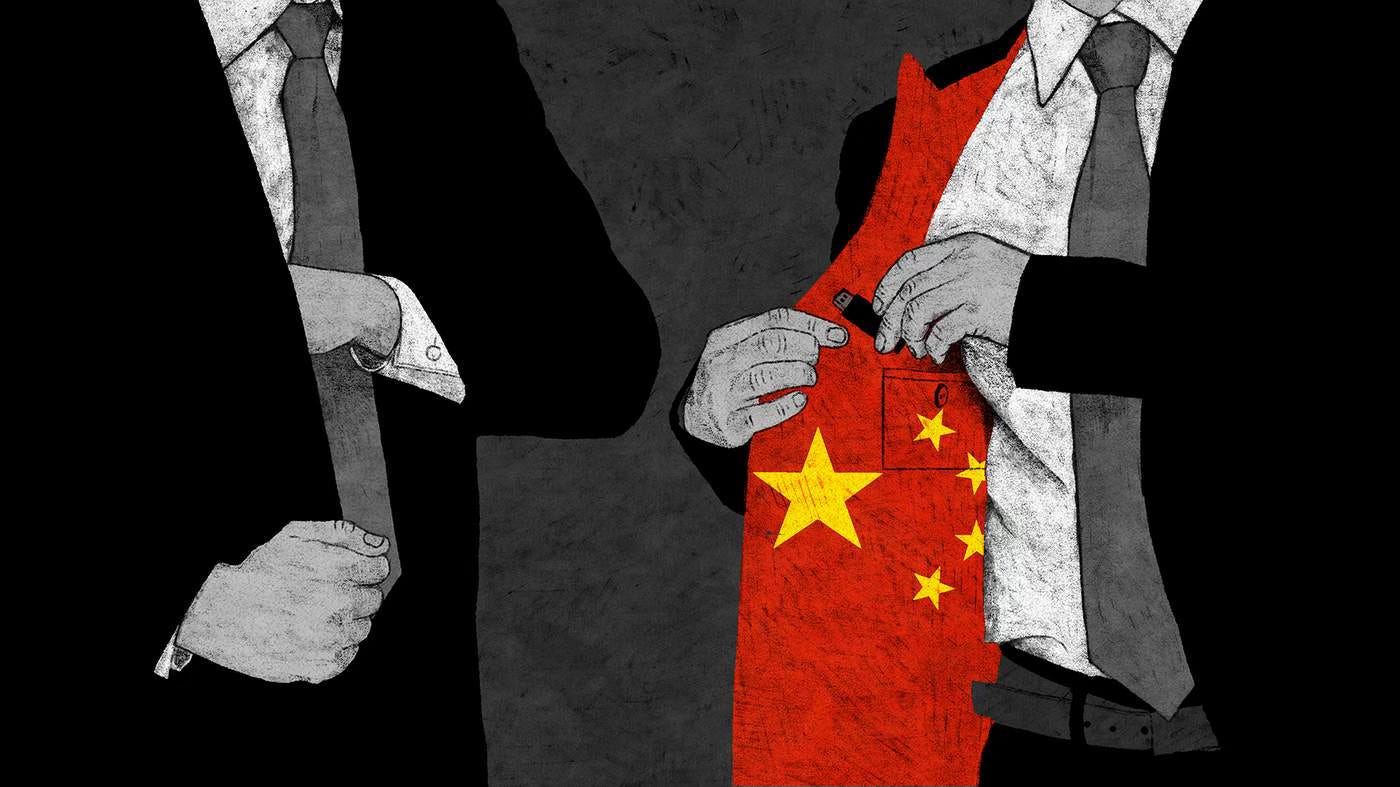Chinese Espionage in South Korea is a U.S. Intelligence Problem
Disgruntled South Koreans in high tech industries can too easily cash in on shady Chinese offers for manufacturing secrets
One day last month, an Asiana Airlines flight sat on the tarmac at Incheon airport in Seoul, South Korea, waiting to push back from the gate for a routine flight across the Yellow Sea to China. The passengers had boarded; everything seemed normal.
But then several minutes passed, and nothing happened. The airplane door remained open. Finally, the voice of a flight attendant crackled over the intercom, “Could [passenger X] please come to the front of the plane?”
The passenger, a man in his forties surnamed Kim, rose from his seat and nervously moved forward. As he approached the cockpit, Mr. Kim was swarmed by airport police and South Korean intelligence agents, who escorted him off the plane and arrested him on the spot.
Buried in Mr. Kim’s luggage were no state secrets or military plans, but arguably something equally vital to Korea’s national security: manufacturing data for high-bandwidth memory (HBM) semiconductors.
Had South Korean authorities not been able to execute this emergency arrest—the first ever for a technology theft crime— the secrets would have ended up in the hands of China.
Mr. Kim was a former employee of a SK Hynix supplier that helped the South Korean conglomerate develop the technology to become a world leader in HBM chip manufacturing. These chips are essential for the rapid data processing that underpins generative AI, including NVIDIA’s most advanced chips, and they’ve become one of the crown jewels in South Korea’s technology ecosystem.
Beijing has been after HBM manufacturing secrets for their own chip industry for years. South Korea has been a rich source of these secrets, but the problems go far beyond semiconductors. Over the past two years, I’ve tracked more than 40 cases of Chinese economic espionage in South Korean tech sectors, a number that likely represents a fraction of the total.
Unlike the U.S., the South Korean government has never acknowledged China to be behind the problem, despite the fact that 75% of overseas economic espionage cases benefit Beijing, and several industries that China dominates can be directly traced back to South Korean intellectual property theft. Local media, at least, have finally begun to raise awareness of the problem with headlines like “Korea on high alert as China-linked tech leaks persist”, “Twenty-five cases of overseas technology leaks this year, the highest ever,” and my favorite, “Why develop technology? You can just steal it from Korea…”.
Turncoat Profiles
Most of these cases follow a similar script. An employee of one of Korea’s flagship companies—think Samsung, SK, LG, and Hyundai (or one of their subsidiaries)—reaches a point in their career when they are competing with their colleagues for a dwindling number of senior level positions. When one of them is inevitably passed over, perhaps by a go-getting junior colleague, their expected response is to quit the company. In South Korea’s hierarchical society, it just isn’t proper for your boss to be younger than you.
Naturally, many of these mid-career engineers begin looking abroad for more lucrative work, and they find it in China. The offers they receive from Chinese companies are often three to four times what they were making in Korea, including generous housing stipends and resettlement allowances.
In order to seal these deals, Korean workers are usually encouraged (or ordered) to take their previous employer’s trade secrets with them. The tradecraft of these industrial spies is surprisingly low tech. Some will sit in their office after hours and take pictures of internal documents. Some will email thousands of files to their personal accounts. One guy tried to sneak a USB full of trade secrets out in his sock.
If they evade detection and arrest, these engineers arrive in China, where they either join a rival firm or launch a startup backed by local governments. One former Samsung executive stole the blueprints for an entire semiconductor lab and was planning to build a replica of Samsung’s Xi’an factory just down the street.
American Risk
Given all this evidence, it is indisputable that Chinese economic espionage poses risks for South Korea. But why does this matter to Americans? Two reasons.
First, it undermines U.S. efforts to prevent Chinese technology dominance. Washington has spent the past decade tightening export restrictions that stop China from accessing cutting-edge technology. But if Beijing can get strategic industrial secrets from Korea with ease, those efforts are moot. It is South Korea, not the United States, that leads in sectors like memory chip manufacturing and shipbuilding. It is also at or near the cutting edge with some batteries, biotechnologies, chemicals, and a host of other strategic technologies that are better off in the hands of an America-friendly democracy than they are in China.
Second, if South Korean companies are not properly vetting their employees for ties to China, it is a risk to the American firms who partner with them. American companies in high-tech sectors work closely with Korean counterparts, and South Korea has invested heavily in the United States. Hyundai operates a massive EV manufacturing facility in Georgia; LG has one in Texas. Samsung and SK hynix have put billions into U.S. factories and partner with giants like NVIDIA. If the knowledge shared between these companies goes back to a Seoul headquarters full of disgruntled middle managers who just got offered half a million dollars to work in Beijing, this poses serious risks for American intellectual property as well.
Given these direct threats to US interests, American intelligence officials and risk management consultants should be swarming into South Korean government agencies, board rooms, research institutes, and universities to help disrupt China’s industrial espionage tactics.
The offers they receive from Chinese companies are often three to four times what they were making in Korea, including generous housing stipends and resettlement allowances.
In an earlier era, I would have recommended that the U.S. work more closely with allies like Korea to mitigate these risks. But with the US increasingly focused inward, defunding news outlets critical of China and cutting intelligence agency staff, it is naive to think that this administration will offer a helping hand to track Chinese spies in Korea or any other allied country. Rather, if the Trump administration were to address this issue, I imagine it would take the form of threatening higher tariffs, U.S. troop withdrawals, and subsidy cuts for Korean companies if Seoul cannot clamp down on the problem.
While pressuring the South Koreans to fix this problem themselves might spur more action in Seoul in the short term, it isn’t a long-term solution, simply because no one country alone can address the cross-border problem of state-sponsored industrial espionage. No amount of onshoring or economic coercion by the Trump administration is going to bring strategic supply chains completely inside U.S. borders. This means South Korea will remain a critical link in the global technology landscape for the foreseeable future. The U.S. should be working with them to reduce common threats. And few threats have the potential to be more disruptive to U.S. economic security interests than Chinese industrial espionage in South Korea.
Ben Forney is an East Asia security and risk consultant based in South Korea. He holds a PhD from Seoul National University and is the author of The Spy Hunter newsletter on Substack. This is his first piece for SpyTalk.








Great piece. I hope it's read widely.
Ben, great job with your inaugural post. Hadn't been following you but this piece and your newsletter are great. Fine addition to the Spy Talk team 😀.